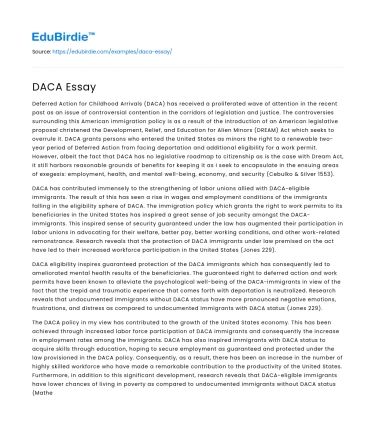Deferred Action for Childhood Arrivals (DACA) has received a proliferated wave of attention in the recent past as an issue of controversial contention in the corridors of legislation and justice. The controversies surrounding this American immigration policy is as a result of the introduction of an American legislative proposal christened the Development, Relief, and Education for Alien Minors (DREAM) Act which seeks to overrule it. DACA grants persons who entered the United States as minors the right to a renewable two-year period of Deferred Action from facing deportation and additional eligibility for a work permit. However, albeit the fact that DACA has no legislative roadmap to citizenship as is the case with Dream Act, it still harbors reasonable grounds of benefits for keeping it as I seek to encapsulate in the ensuing areas of exegesis: employment, health, and mental well-being, economy, and security (Cebulko & Silver 1553).
DACA has contributed immensely to the strengthening of labor unions allied with DACA-eligible immigrants. The result of this has seen a rise in wages and employment conditions of the immigrants falling in the eligibility sphere of DACA. The immigration policy which grants the right to work permits to its beneficiaries in the United States has inspired a great sense of job security amongst the DACA-immigrants. This inspired sense of security guaranteed under the law has augmented their participation in labor unions in advocating for their welfare, better pay, better working conditions, and other work-related remonstrance. Research reveals that the protection of DACA immigrants under law premised on the act have led to their increased workforce participation in the United States (Jones 229).
Save your time!
We can take care of your essay
- Proper editing and formatting
- Free revision, title page, and bibliography
- Flexible prices and money-back guarantee
DACA eligibility inspires guaranteed protection of the DACA immigrants which has consequently led to ameliorated mental health results of the beneficiaries. The guaranteed right to deferred action and work permits have been known to alleviate the psychological well-being of the DACA-immigrants in view of the fact that the trepid and traumatic experience that comes forth with deportation is neutralized. Research reveals that undocumented immigrants without DACA status have more pronounced negative emotions, frustrations, and distress as compared to undocumented immigrants with DACA status (Jones 229).
The DACA policy in my view has contributed to the growth of the United States economy. This has been achieved through increased labor force participation of DACA immigrants and consequently the increase in employment rates among the immigrants. DACA has also inspired immigrants with DACA status to acquire skills through education, hoping to secure employment as guaranteed and protected under the law provisioned in the DACA policy. Consequently, as a result, there has been an increase in the number of highly skilled workforce who have made a remarkable contribution to the productivity of the United States. Furthermore, in addition to this significant development, research reveals that DACA-eligible immigrants have lower chances of living in poverty as compared to undocumented immigrants without DACA status (Mathema 45).
The conditions sacrosanct for eligibility in DACA policy which spells out that the individuals must have good conduct with no records of felonies or solemn misdemeanors have led to the selective granting of DACA status to individuals who are potentially crime free. The results to which have seen reduced levels of crime among individuals with DACA status. Research shows that immigrants with DACA status have lower crime rates as compared to Native Americans and hence therefore it is apt to posit that the policy has ameliorated security through its provisioned conditional tenets of admitting only crime-free immigrants (Uwemedimo et.al 140).
Conclusively, it is beneficial to keep the DACA policy because it is a viable platform for ameliorating employment policies through increased workforce participation, improving health and mental well-being, growing the economy, and ameliorating security.






 Stuck on your essay?
Stuck on your essay?

